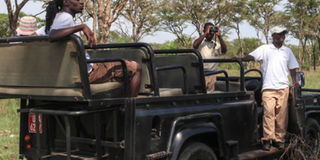Cheaper packages to spur domestic tourism

When Uganda Wildlife Authority (UWA) announced plan to introduce cheaper options for transport and packages to national game parks a few months ago, it sparked off a heated debate. Many tour operators thought that the semi-autonomous government agency was acting beyond its jurisdiction.
According to UWA executive director Andrew Seguya they are starting a campaign to promote domestic tourism focusing on Ugandans and East Africans, targeting organised groups such as corporate companies, families and friends looking at exploring Uganda’s national parks.
“It will not be just about providing cheaper transport options but a whole service package. We are acquiring 10 game drive vehicles and three double-decker boats. The boats will be stationed in Queen Elizabeth National Park, Murchison Falls National Park and Lake Mburo National Park. We will concentrate on weekend gate-aways,” Seguya says.
The current costs
Tourism packages are determined by three factors, according to Steven Waswa of Kakungulu Safaris which probably explains the high figures. He outlines factors such as the number of people on the trip, where more means cheaper rates, the destination that will depend on the nature of accommodation and activities one will engage in as well as duration of the trip.
“Of course, if you are alone the cost will almost shoot through the roof but if you are 5 to 8 people it gets fairly cheaper per person. Actually a group of 6 people to Murchison falls would cost about $500 (about Shs1.6 million) budget, mid-range $1,200 and luxury $1,600,” he explains. Abiaz Rwamwiri, director of Africa Wild Explorations attributes the high prices to high costs.
“A trip to Kidepo in luxury is for a minimum of eight days with a fly out of Kidepo costing between $2810 and $3,200. This covers for full board, all meals and accommodation. Accommodation at Kidepo is $370 per person per night. Accommodation and vehicle used determine the high prices. Using a land cruiser is different from the van,” he illustrates.
Weighing the options
UWA’s buses, looking to reduce transportation costs will set off on a Friday afternoon or evening and return on Sunday evening. The government-funded project will, according to Jossy Muhangi, the UWA spokespereson, work with hotels and service providers to provide affordable accommodation and catering services plus the itinerary.
“UWA is soon recruiting sales officers to sell the packages to potential tourists. The same project will provide game-drive vehicles to ease game viewing within the parks,” Muhangi says.
UWA will thus work hand-in-hand with tour operators, facilitating the process of taking the tourists to parks and negotiating cheaper accommodation. “We are still in negotiations on how much we will be charging for transport to the different destinations,” says Seguya.
Tour operator, Amos Wekesa, isn’t keen on the development, arguing that by acquiring cars, UWA is missing the point.
“Most of the resources should be dedicated towards improving the numbers (of tourists) coming into the country at the airport.
If you have one airport that handles 1.3 million passengers per year and compare it with others in the region, for example, Kenya, which handles 8.8 million passengers a year, Kilimanjaro - four million passengers, let alone Dar es Salaam, we still have a lot to do to improve,” Wekesa argues.
Currently, the tourism budget stands at Shs188.8 billion, however, the specific allocation to this project hasn’t been revealed.
Boost tour operators
Wekesa stresses that the role of government should be to create an enabling environment for the private sector to survive and it should focus its energies on making sure all the tour companies closing have business. He believes that UWA’s initiative is not sustainable and contends that the vehicles will not be existent in 10 years.
“You don’t find Kenya Wildlife Society doing business in Kenya. It is important that resources used to buy vehicles go towards marketing the tourism potential of this country and attractions to the population for private sector to take them to the national parks because it is sustainable,” Wekesa contends.
Abiaz Rwamwiri, the director of Africa Wild Explorations, however, points out that a tour operator has a completely different market.
“Mweya has a lodge, UWA has bandas. Each has their market. It would be selfish of tour operators to fight UWA. There is a talk about UWA diverting from their mandate, but ask one of them to mention when they ever contributed to addressing human wildlife conflict,” Rwamwiri argues.
He adds that Ugandan tourism is evolving and cannot be satisfied by one effort. “I welcome any strategy to have an extra person in our parks. For UWA, any extra dollar they can earn is good for conservation,” he says.
Seguya explains that the buses, a cheaper option that is expected to commence this December, is likely to cost well under Shs1 million depending on packages and destinations to be visited.
The five buses will have WI-FI, coffee on board, flat screen for visual entertainment and information, electric sockets, and more.
With a timeline set for December, Ugandans can hope for the best.
Tour operators speak out
Mulembe Krazy Trekkers. Sheila Nabunya, the manager of Mulembe Krazy Trekkers, a tours and travel company, believes the initiative will create more options to promote tourism.
“They may reach more people than just UWA platforms and providing more affordable services to locals is even much better when locals get to experience the beauty of touring these places.
It will be easier for the bodies concerned to preach about conservation and protectionism so the animals are not poached and in case they are criminals, they are willingly reported.”
Brovad Tours and Travel. Rashid Kiyimba who runs Brovad Tours and Travel believes that harnessing from the experience of tour operators will be essential for the success of this initiative. “It will increase our business and encourage domestic tourists, but of course UWA has to work with the tour operators as they have the experience in handling tourists,” he explains.




